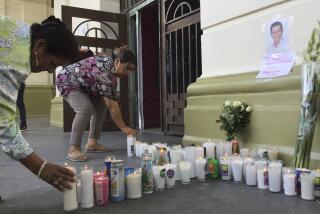Possible New Suspects in Colosio Killing Questioned : Mexico: Detained are more members of the 45-man crowd-control unit present when ruling party’s candidate was shot.
TIJUANA — Mexican authorities questioned possible new suspects Tuesday in the assassination of presidential candidate Luis Donaldo Colosio, even as they delved into the murky world of the politically connected former police officers who have become a focus of their investigation.
Although federal authorities said little about the case Tuesday, it was widely reported here that they had detained for questioning more members of a 45-member crowd-control unit provided for Colosio by the Tijuana branch of the ruling Institutional Revolutionary Party, known as the PRI.
Four members of the security team--including one of its organizers, Rodolfo Rivapalacio Tinajero, a former police detective--have been arrested in connection with the March 23 killing of Colosio, who was widely expected to become Mexico’s next president.
Rivapalacio is accused of using his position to assist at least five men; they allegedly encircled Colosio after a crowded campaign rally here, obstructed the candidate’s federal bodyguards and cleared a path for an assassin who shot him at point-blank range.
Newspapers here reported that at least six more men were being interrogated Tuesday, including a former Baja California transportation official with ties to past PRI administrations and a former police commander whose wife arrived at federal police headquarters seeking information on her husband.
State Gov. Ernesto Ruffo Appel said this week that Colosio’s local security team--which was different from his federal bodyguards, who are members of the Mexican equivalent of the U.S. Secret Service--included officers who had been fired and charged with criminal misconduct.
In Tijuana, critics have been outspoken in labeling Colosio’s assassination a political killing, citing links between the former police officers in his local security force and the state’s PRI political machine. In the late 1980s, that machine was hit with a wave of corruption scandals that helped elect Ruffo, Mexico’s first opposition governor.
Political observers point out that PRI veterans in Baja long were furious with Colosio because as the ruling party’s national leader in 1989 he had conceded the loss of the Baja gubernatorial race in a gesture of political reform rather than contesting it.
Meantime, interviews Tuesday painted a portrait of the most prominent suspect, Rivapalacio, as a classic figure in Mexican politics: the police official who leaves the force when his political mentors are deposed and thrives financially and politically.
Rivapalacio, 52, is a 30-year law enforcement veteran and a member of the PRI’s municipal governing council, said his wife, Marta Guadalupe Sanchez de Rivapalacio.
In a telephone interview Tuesday, she defended her husband’s record in the state police as being exemplary. Rivapalacio “has received many awards, including awards from American police agencies on investigations in which there was collaboration,” she said.
But Tijuana human rights activists and longtime observers of his agency expressed a different view.
They noted that Rivapalacio, former chief of the burglary and homicide squads, served under the scandal-plagued administration of Xicotencatl Mortera Leyva, the former governor who resigned abruptly in 1989.
They said Rivapalacio was one of several officers who left or were pushed out when the PRI lost power. His wealth--he reportedly owns an apartment building and a spacious house with a swimming pool--raises suspicions because of the rampant corruption during the period he worked for the police. “He lived very well,” said a Baja official.
Rivapalacio’s wife said the family has simply succeeded in private business ventures. She termed press portrayals of their wealth unfair.
Since leaving the police, Rivapalacio had often organized security for political functions and served on a civic anti-crime committee, PRI officials said.
Federal authorities assert that he recruited co-conspirators Tranquilino Sanchez Venegas, Vicente Mayoral Valenzuela and Mayoral’s 23-year-old son for Colosio’s security team with the intent of carrying out the assassination. Sanchez and Mayoral are both former police officers and favored the PRI.
“Like any good Priista (PRI loyalist), he (Mayoral) volunteered his time when he was needed,” said Mayoral’s son-in-law, Gerardo Becerra.
But family members said Sanchez and Mayoral, also a former chief homicide detective, lived more modestly than Rivapalacio; they said they did not hold party posts. Both men are close to 60, are not in the best health and live in working-class neighborhoods, relatives said.
Human rights activists in Tijuana have stated that the elder Mayoral was linked to corruption and abuse of suspects while with the state police. But Becerra denied those charges.
There was no further word Tuesday on the whereabouts of two unidentified suspects whom Mexican authorities, citing videos and photographs of the assassination, accuse of aiding the alleged conspirators. One possibility, authorities said, is that the suspects have fled north into the United States. If that is the case, U.S. federal agencies will be asked for assistance, officials said.
More to Read
Sign up for Essential California
The most important California stories and recommendations in your inbox every morning.
You may occasionally receive promotional content from the Los Angeles Times.










